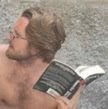
Last Wednesday, I visited the local Church of Christ in Sidney, Nebraska. I was out on business, and well, what else is there to do besides play shuffleboard in the local bar? Don’t get me wrong, I love shuffleboard, but had already frequented the “Silver Dollar” the previous night. It was a medium size building, which gave me hope that I could probably make some connections through the ACU network. When I walked into the auditorium, I was greeted by no less than fifteen to seventeen people filling up one aisle of the church. I knew I was taking a risk by attending, and viewing the sparse faces in the crowd confirmed that I had lost my bet with fate, and could not simply pop in and maintain a relative sense of anonymity. After much explaining and easing of fears as to why a young person would grace their assembly, I was soon welcomed into the small life of the church. They wanted me to lead singing, and while, I love to sing the old songs, I have never been graced with a confidence of pitch to actually lead worship. Where’s Daniel Wheeler when you need him?
The irony of the situation is that I have great confidence in my speaking/preaching ability, but judging from the lesson of that night, I could in no good faith offer up words of exhortation, exegesis, or worship that would gel with the firm convictions in Biblical authority and inerrancy, not to mention a wonderful assurance that interpretation of the Bible is straightforward and is not mediated by any whims of culture, intelligence, or history that the Church holds. This realization made me feel like a voyeur, or a PhD candidate in rhetoric studying the “heuristics” of a small time denomination in a small town. I felt more a sense of the sovereignty of the community than a sense of an impoverished theology bent solely on getting to Heaven. Which in turn, made me feel like the typical liberal, forever tolerant and a respecter of persons. To their delight, I told them that I would return next Wednesday night, which I am still planning to do, barring a hankering for shuffleboard. I didn’t want to change them, or explore ways in which, as a community they could broaden their definition of fellowship to include more people than showed up that night. For starters, it is not my community. I don’t feel like it is appropriate to engage in theological discourse where there is a lack of accountability between individuals and communities. To do so would be to come across as foolish as the swindlers (the Prince and Dauphine?) in Huckleberry Finn when they put on mock spiritual revivals. The members of the Church eke out an existence from the ground or at the Cabella’s outdoor headquarters. They solidify their community, not by what they believe, but by simply making the time to show up and be with each other. And although I tell their story in a light that makes Grace abound to all of our foolish human searching, (which reifies my own positions), I do not tell their story in a manner that trivializes what they do when they show up. I do not know where the boundaries of the Church end and begin. I withhold my judgment, at least to their faces, on their quite virulent theology. It just doesn’t seem to be my place to discourse with them.
I tell this story to confess how much our community means to me. Perhaps we are like minded, perhaps we are monolithic in our theology, but I don’t think so. We have diversity, and more importantly, accountability that allows us to engage in discourse. We should never take this for granted, because community is a hard thing to form. I hope we grow together in faith and good works, whatever that means. I hope we build communities with those we see face to face on a regular basis. I hope we are transformed, and I hope we figure this whole thing out, at least for the time being. I’ve started a sermon I want to present the preacher of the Church of Christ in Sidney. When I finish, I’ll post it up here.
Bryce






2 comments:
As far as I can tell, it seems that any discourse performed in the realm of the everlasting and the trickles-down thereof constitutes a sort of theological outreach. I am not schooled well enough in the language of theological discussion to be able
to differentiate the typical evangelistic attack/outreach from
"the theological reading room"
discussion over the post-structuralist interpretation
of some biblical text (for example) other than the attitude involved therein. With less convolution, I say that it seems to me that any discussion constitutes some sort of
evangelical outreach, if I may use
that term outside of some
Capitalized proper form with which
I am not familiar.
So attending a C of C and singing
All Hail the Pow'r of Jesus' Name
may not necessarily place one in any sort of situation to discuss,
especially as a sporadic visitor.
But I would say that if a community wishes to have you speak or preach or comment, then it seems that one would be best to stick to what they believe, or at least what they are striving to understand, and to present this in the form of what could be a discussion. I believe that any religious outreach should rightly come in the form of discussion, with humility, because after all, although you may be attempting to speak on behalf of an Almighty God, you are a little bag of bones with several imperfect filters (again, my personal understanding).
I believe the difference that you
pointed out is the key to the
appropriateness of the occurrence of such a discussion. In the context of a community based upon common theological strivings, which you have warmly established and electronically nurture here, such discourse is not only appropriate, but absolutely necessary. And in the case of the Sidney C of C, I agree that one must form some sort of relationship with a community before asking them to run
with you down some road to God. At
least, that seems to integrate the
heart into this discussion.
I suppose this may be confusing as
it is not really specifically
targeting or countering anything
you wrote, but these thoughts
seemed to come clearly enough in
light of what you stated. So I wait to see what it is you write next.
It's strange how a return to the tradition of our upbringings, our theological "fatherlands", after years of wandering the deserts of critical thinking, can feel at once like a homecoming and an exploration of unknown territory. How do I talk to these strange people? How do I convince them--and myself--that I'm one of them (but not really)?
This reminds me of a graduate Old Testament class I had with Mark Hamilton. The issue came up about how to walk the delicate balance of candidness and pastoral sensitivity when discussing issues like the historical-cultural contingency of Holy Scripture with church members who haven't, say, gone to seminary. Hamilton, who got a PhD in Hebrew Bible at Harvard, refers to himself as a "Cambellite of Cambellites, of the tribe of Arkansas, baptized on the 11th year". No one can claim more Church of Christ credibility on paper than he can. Yet he admitted that, quite simply, there are things he cannot and should not say from the pulpit when he guest preaches at various small West Texas churches. He's in his mid-forties, which he says is still a suspiciously young age at which to assume any authority. And there is a level of personal credibility and trust one must have with a community that comes only with time, regardless of one's credentials (whether academic or based on years in ministry or otherwise).
So maybe you can't say anything. Or maybe you can, someday. Ultimately I think you'll be able to feel that out in the community. But you'll certainly have to play the game--learn the language, do the dance. And I think you're a good enough orator to be able to do that with relative ease and without sounding or feeling like your peddling something.
Thanks for your words on this community, too. You're right, we have a good thing here, even if we are a bit monolithic at times. But I want to thank you, and the rest of you, for the integrity and the trust to call me out and keep me critical when I stray from the "short and narrow". Monolithic or not, that's what makes a good community.
Post a Comment